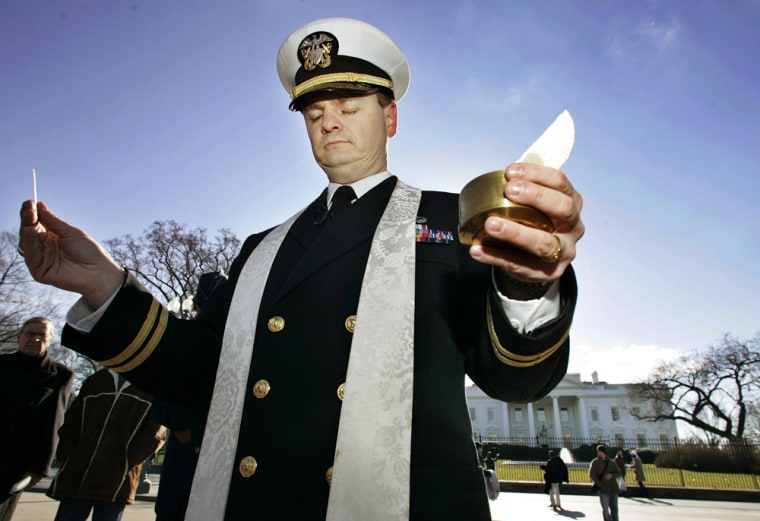The U.S. military is being buffeted by dueling legal claims over religion, with one set of plaintiffs contending that the Pentagon is suppressing evangelical Christianity and another set arguing just the opposite -- that the brass gives the most aggressive evangelicals free rein to proselytize in uniform.
Although Congress intervened this fall, directing the Air Force and Navy to rescind controversial new policies on religion, chaplains on both sides of the issue said the congressional action only muddied the waters.
"Congress took action, but who won? I'm not sure. The only thing I can safely predict is, get ready for new controversies over the place of evangelism in the armed forces," said retired Navy Capt. Gary R. Pollitt, executive director of the Military Chaplains Association, a private, nonprofit group representing chaplains in all the services.
In the latest lawsuit, an evangelical Christian chaplain is charging the Navy with violating his First Amendment rights by forbidding him to pray "in the name of Jesus" at public ceremonies.
Chaplain Gordon J. Klingenschmitt filed the lawsuit Oct. 25 in U.S. District Court for the District of Columbia with assistance from the Rutherford Institute, a Charlottesville-based public interest law firm that sued the Pentagon over its policy of requiring U.S. servicewomen stationed in Saudi Arabia to wear a Muslim head covering.
Can prayers be censored?
Klingenschmitt's suit alleges that the Navy has effectively established a "civic religion" and is "suppressing [his] Christian faith" by requiring him to offer nonsectarian prayers when speaking to diverse groups of sailors.
He also alleges that his objections to the Navy policy are the real reason that his commanders court-martialed him in September and are now in the process of kicking him out of the Navy. Klingenschmitt was found guilty of disobeying an order by wearing his uniform at a political protest in front of the White House.
"Can the Navy censor a chaplain's prayers, yes or no? That's what my suit is asking," Klingenschmitt said yesterday.
A spokesman for the Navy, Lt. j.g. Karl Lettow, said it does not comment on pending litigation. Navy officials have said that chaplains are free to pray however they wish in voluntary worship services but that the Navy encourages them to "respect the diversity of their audience" when addressing mandatory gatherings.
Meanwhile, a former White House counsel whose lawsuit against the Air Force was dismissed last week said he intends to refile a broader suit, or possibly multiple suits, accusing all the armed services of allowing evangelical Christians to pressure members of other faiths.
U.S. District Judge James A. Parker dismissed the initial suit by Michael L. "Mikey" Weinstein because it was based on alleged incidents of religious bias at the Air Force Academy, but neither Weinstein nor any of his five co-plaintiffs claimed to have suffered from those incidents.
Weinstein, who spent 10 years as an Air Force lawyer and worked in the Reagan White House, said he is now picking the best cases from "a veritable cornucopia of new plaintiffs and accusations."
Reports of aggressive evangelism
Some evangelical groups and individuals "believe they have an illimitable right to push their biblical worldview in the military, 24 hours a day, seven days a week, up and down the chain of command," Weinstein said. "Our view is that you certainly have that right at certain times and places that are well established by the U.S. Constitution and our case law. . . . But you can't do it on the job when you're wearing the uniform during the workday."
Reports of aggressive evangelism at the Air Force Academy led the service to issue interim guidelines last year urging commanders to be "sensitive" about sharing their faith and called for a minute of silence or at most a "brief, non-sectarian" prayer at mandatory gatherings.
Evangelical groups complained about the Air Force guidelines and a similar Navy instruction, and House Republicans proposed legislation to guarantee that chaplains can always pray as they wish. In a compromise, that wording was dropped from a defense authorization bill, but a legislative report urged both the Air Force and the Navy to rescind their policies. Congress is expected to hold hearings on the issue next year.
